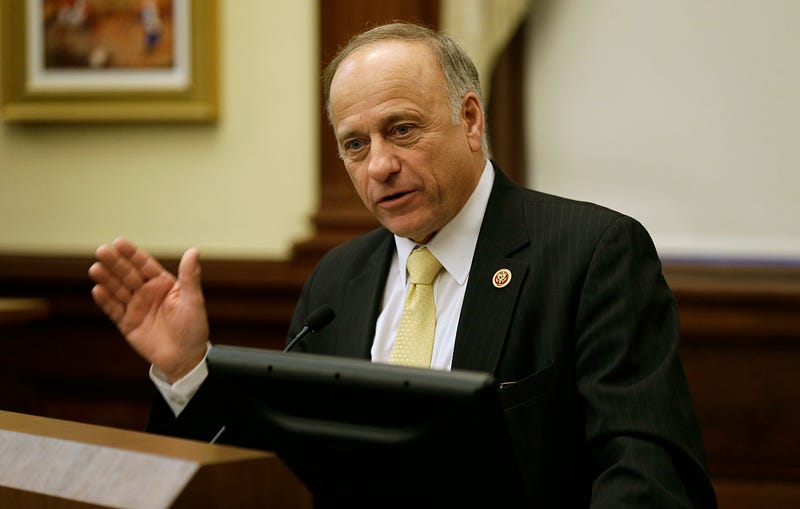On Wednesday, Republican Reps. Steve King (IA) and Joe Wilson (SC) re-introduced a so-called right-to-work bill that would significantly hamper unions across the country and likely lower wages for all Americans.
Republicans have proposed this kind of legislation before; King introduced a similar bill almost exactly a year ago. But now they may feel emboldened by having an ally in the White House. On the campaign trail, President Trump said he is “100 percent” in favor of right-to-work laws.
No American can be forced to join a union or pay dues that are used for political purposes. But right-to-work laws go further: they repeal the requirement that all employees in a unionized workplace must pay dues to the union, given that it bargains on behalf of all workers — and, therefore, the benefits of those negotiations flow to everyone. Without that requirement in place, critics of these laws argue, they create a free rider problem: Employees can refuse to pay dues while still reaping the benefits of higher wages or more generous benefits negotiated by the union — including having the union take up a grievance on their behalf, which can be costly.
That can significantly hobble unions’ finances, given that they still have to do the same work as before but with less money, making it more difficult for them to operate and organize more workers.
So far, 27 states have gone right-to-work. And in those states, workers are much less likely to be in a union: Those in non-right-to-work states are about two-and-a-half times more likely to be in one or protected by a union contract.
Research has found that this has a serious impact on everyone’s wages, even those not in unionized workplaces. According to a paper from the Economic Policy Institute, wages in right-to-work states were 3.1 percent lower as of 2012 than in those without these laws, even when controlling for a variety of factors. That translates into a loss of more than $1,500 a year for an individual full-time worker.
It’s not just wage that are impacted, either, given that unions negotiate on a broader range of issues. Employees in right-to-work states are also less likely to get health insurance or pensions from their employers.
Unionization has already been steadily declining across the country for some time. Less than 11 percent of the workforce was in a union last year, a 0.4 percent decline over the year before, and a precipitous drop from the 20 percent who were in a union in 1983, the first year for which data are available.
This is generally troubling for Americans’ finances. There is a strong relationship between declining union membership and declining incomes for the country’s middle class. There is also evidence that falling unionization is strongly associated with increasing income inequality, where more of the money generated goes to the wealthiest, leaving less for everyone else.
Original Article
Source: thinkprogress.org/
Author: Bryce Covert
Republicans have proposed this kind of legislation before; King introduced a similar bill almost exactly a year ago. But now they may feel emboldened by having an ally in the White House. On the campaign trail, President Trump said he is “100 percent” in favor of right-to-work laws.
No American can be forced to join a union or pay dues that are used for political purposes. But right-to-work laws go further: they repeal the requirement that all employees in a unionized workplace must pay dues to the union, given that it bargains on behalf of all workers — and, therefore, the benefits of those negotiations flow to everyone. Without that requirement in place, critics of these laws argue, they create a free rider problem: Employees can refuse to pay dues while still reaping the benefits of higher wages or more generous benefits negotiated by the union — including having the union take up a grievance on their behalf, which can be costly.
That can significantly hobble unions’ finances, given that they still have to do the same work as before but with less money, making it more difficult for them to operate and organize more workers.
So far, 27 states have gone right-to-work. And in those states, workers are much less likely to be in a union: Those in non-right-to-work states are about two-and-a-half times more likely to be in one or protected by a union contract.
Research has found that this has a serious impact on everyone’s wages, even those not in unionized workplaces. According to a paper from the Economic Policy Institute, wages in right-to-work states were 3.1 percent lower as of 2012 than in those without these laws, even when controlling for a variety of factors. That translates into a loss of more than $1,500 a year for an individual full-time worker.
It’s not just wage that are impacted, either, given that unions negotiate on a broader range of issues. Employees in right-to-work states are also less likely to get health insurance or pensions from their employers.
Unionization has already been steadily declining across the country for some time. Less than 11 percent of the workforce was in a union last year, a 0.4 percent decline over the year before, and a precipitous drop from the 20 percent who were in a union in 1983, the first year for which data are available.
This is generally troubling for Americans’ finances. There is a strong relationship between declining union membership and declining incomes for the country’s middle class. There is also evidence that falling unionization is strongly associated with increasing income inequality, where more of the money generated goes to the wealthiest, leaving less for everyone else.
Original Article
Source: thinkprogress.org/
Author: Bryce Covert

No comments:
Post a Comment